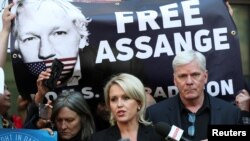The Australian government says Queensland-born Julian Assange will get no special treatment after his arrest in London. However, lawyers for the WikiLeaks co-founder are urging Canberra to intervene to stop his extradition to the United States.
Assange had been living in Ecuador’s London embassy for seven years before he was arrested Thursday. He could also face a renewed investigation into an allegation of rape in Sweden.
The United States wants to extradite Assange from Britain because of his alleged role in one of the largest leaks of government secrets in 2010.
One charge, maybe more
Australian-born Assange faces a charge of conspiracy to commit computer intrusion in the U.S. He could be jailed for up to five years, but it is possible that further charges could be added later by prosecutors.
Swedish justice officials also say they are re-examining a suspected rape at the request of the alleged victim’s lawyer.
Assange sought refuge in the Ecuadorian embassy in London in 2012 to avoid extradition to Sweden over the allegations of sexual assault. But Ecuador abruptly withdrew its asylum Thursday and allowed U.K. police to arrest the WikiLeaks co-founder.
No special treatment
Australian Prime Minister Scott Morrison says Assange, who was born in the Queensland city of Townsville, will get no special treatment.
“We support Australians in those cases by providing that consular assistance, so Mr. Assange will get the same support that any other Australian would in these circumstances. He is not going to be given any special treatment. He will be getting the same treatment as everybody else, he will get the same support as everyone else.”
Campaigners in Australia consider Assange’s arrest and possible extradition to Sweden or the U.S. a threat to investigative journalism.
Greg Barns, Assange’s Australian lawyer, is urging Canberra to do more to protect him.
“The United States is seeking to extradite a person who has simply expressed themselves, if one can put it that way, in accordance with a core liberal value, which, of course, is freedom of speech, and Australian journalists and Australians generally, I think, should be very, very concerned about the chilling impact of this precedent, and the Australian government therefore and Australian politicians ought to be concerned about it.”
Any request by the United States to extradite Assange must be processed through the U.K. court system.
The Australian is scheduled to face a hearing over his possible extradition to the U.S. in early May.




